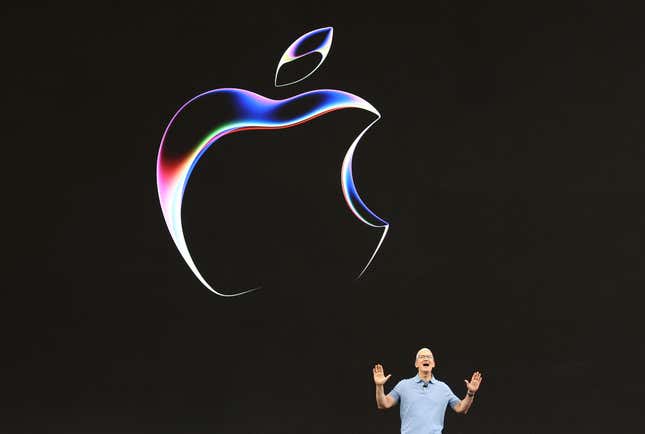
Apple’s Worldwide Developers Conference kicks off Monday with what is becoming a familiar problem for the Cupertino tech giant: The company that once set the pace for consumer technology finds itself playing catch-up in the industry’s most important race.
While Apple will unveil sweeping visual redesigns across its operating systems — including a new “digital glass” interface inspired by its Vision Pro headset — the AI announcements are expected to be underwhelming compared to the rapid-fire innovations competitors have unleashed in recent months.
The contrast with Google I/O just three weeks ago couldn’t be starker. Google’s developer conference was a showcase of AI muscle-flexing: new models that generate music in real-time, realistic video creation from simple prompts, coding assistants that can tackle entire backlogs, and text-to-speech capabilities with customizable voices and accents. Google even introduced tools that can browse the web and use software under user direction — early examples of the autonomous AI agents that many see as the next frontier.
Apple’s most significant AI announcement, meanwhile, will be opening its foundation models to third-party developers. But these models pack just 3 billion parameters — a fraction of the complexity found in the latest releases from OpenAI, Google, or even Apple’s own internal tools, which are rumored to reach into the trillions of parameters.
Bloomberg reported more than a dozen other small updates, including rebranding some existing Safari and Photos features as “AI-powered” and introducing live translation for phone calls and AirPods — capabilities Google has offered on Android for years. A new AI-powered battery optimization mode might arrive later, developed alongside the slimmer iPhone 17 expected this fall.
Perhaps most telling is what won’t be announced: the much-anticipated Siri overhaul that Apple promised last year has been indefinitely delayed. The “LLM Siri” that could finally make Apple’s assistant conversational like ChatGPT remains woefully behind schedule, according to reports. Apple’s AI health service and revamped Health app have been pushed to late 2026.
Instead, Apple will lean heavily on what it does best: design. The new “Solarium” interface will bring transparency and light effects across iOS 26, iPadOS 26, macOS 26, and other operating systems. The company is also switching to year-based naming (hence the “26" designations for software launching later this year) in what appears to be a branding maneuver to project forward momentum.
The Phone app will get its first major redesign since 2007, combining contacts, recent calls, and voicemails into a single scrollable window. Messages will add polling and background images to compete with WhatsApp. A new centralized Games app will attempt to position Apple devices as serious gaming platforms, though it’s unlikely to challenge Nintendo or Sony’s dominance.
The hardware struggles are perhaps even more concerning than the AI delays. Apple once owned the premium device space, but competitors are now encroaching on its turf. Meta has sold 2 million Ray-Ban smart glasses since 2023 and plans to produce 10 million units annually by 2026. Meanwhile, OpenAI has partnered with Jony Ive — Apple’s former design chief who created the iPhone and iPad — on plans for 100 million AI “companions” by the end of next year. These aren’t just software competitors; they’re direct threats to Apple’s hardware dominance.
But these incremental improvements come at a perilous moment for Apple that extends far beyond Monday’s keynote. The company has suffered a brutal 2025: its stock has dropped 20%, making it the worst performer among the “Magnificent Seven” tech stocks and raising questions about whether it even belongs in that elite group anymore. A damaging legal defeat in the Epic Games case threatens its lucrative App Store revenue model, with a federal judge finding Apple in contempt for willfully violating court orders. Mounting tariff costs will add an estimated $900 million in expenses this quarter alone, forcing the company to rapidly reconfigure its China-centric supply chain.
Perhaps most troubling, Apple’s iPhone shipments in China — once a growth engine — cratered by more than 20% in late 2024, according to Counterpoint Research, dropping the company to fifth place in the world’s largest smartphone market. The company can’t even leverage its AI features as a differentiator there, since ChatGPT integration had to be stripped from Chinese iPhones to comply with local regulations.
Apple’s bet on taking a “thoughtful” approach to AI — emphasizing privacy and on-device processing over raw capability — probably has merit in the long term. But tech cycles move fast, and the company risks ceding significant ground to competitors who are shipping powerful AI features today, not in 2026 or beyond.
—Jackie Snow, Contributing Editor